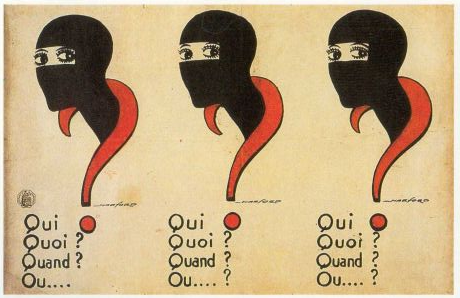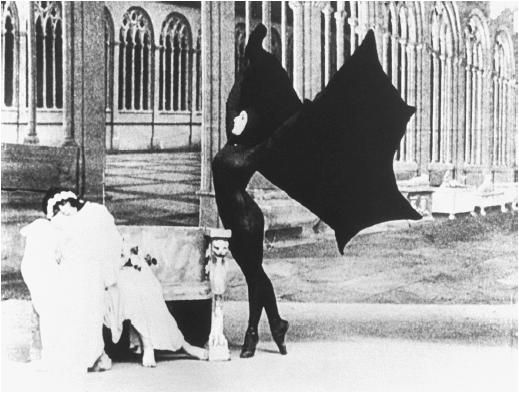
Les Vampires
Director: Louis Feuillade
Starring: Edouard Mathe, Musidora
1915-1916
A French serial from the early – very early – days of cinema, Les Vampires is grandiose and epic in pretty much everything it attempted. It tells the story of a criminal gang calling themselves “Les Vampires” (not actually vampires, sorry Edward fans) and the detective Guerande who is investigating them.
The plot is convoluted to say the least. The episodes range from 25 to 60 minutes or so in length, and they all involve some sort of nefarious scheme of Les Vampires to come after Guerande in one way, shape, or form. There are hidden identities, hidden passageways, codes that need cracking – no one reveals their true intentions right away. It watches like a classic magazine murder mystery serial, just captured on camera. It’s easy to see why it captivated French audiences when it came out; back in 1915, I’m sure it was seen as positively gripping.
Today, however, it has lost much of its appeal. The over-the-top, melodramatic plot devices feel hackneyed and worn, better suited for trashy airplane novels than the cinema.
And did I mention it’s LONG?
To devote oneself to watching Les Vampires requires a commitment of six and a half hours of one’s life. Six and a half hours of watching one hidden identity after another makes each subsequent plot twist less shocking, and by the end, you’re pulling your hair out, waiting for it to end. For goodness sake, don’t try to watch this in one sitting (if you insist on watching it all); it was produced as a film serial, after all – take a break every now and then!

And yet, I will admit I’m glad to have seen it. Why? Because it made me appreciate film technique and the evolution of that technique much more than I previously had. Both Les Vampires and D.W. Griffith’s ground-breaking Birth of a Nation came out in 1915. I have seen both of these films, and the former truly made me appreciate the latter. Feuillade filmed Les Vampires in the same way that many early directors worked – as if a movie was nothing more than a recorded theater production. The camera is stagnant. It is pointed at a room, we see the room, characters enter the room, talk to one another, then leave the room. The camera never changes position once. Next scene – repeat the pattern. In Birth of a Nation, however unpalatable the plot, Griffith does absolutely amazing things with his camera, single-handedly developing the language of camera shots in this one film. There are close-ups, there are zooms, there are cross-cuts. The camera is fluid and dynamic; it enhances the story rather than merely recording it. After watching these two films within a few months of each other, I suddenly understood why Griffith was such a big deal, and why he rightly deserves his place among cinema’s greats, despite having a warped view of humanity.
Would I rewatch Les Vampires? Sure, but you’d have to tie me down and force me, like Alex in A Clockwork Orange. It’s sooooo long, and pretty dull. It’s worth watching for those who are really interested in the evolution of film and early film history. For modern viewers, I would steer you very far clear of it.
4/10 – for an early attempt at telling an epic mystery.
Seems like I am the only one around who actually liked Les Vampires. Maybe I am a bit strange but I really enjoyed watching this serial, though I could have managed without the last 2-3 episodes.
ReplyDelete